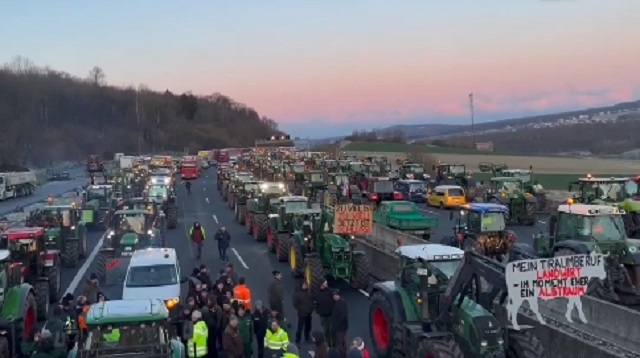Agriculture
Tens of thousands of German farmers protest left-wing government policies, block highways

Canadian Trade Minister Mary Ng
From LifeSiteNews
‘We’re sick of the lies. We’re sick of trying to get rid of our jobs,’ one farmer said.
Tens of thousands of protestors have taken to the streets all over Germany, temporarily blocking streets and highways during the large-scale farmers’ protests in response to the government’s plan to cut subsidies.
On January 8, the first day of a week-long protest that will culminate in a large demonstration in Berlin on January 15, around 19,000 tractors took part in protests in Bavaria, and 25,000 vehicles showed up in Baden-Württemberg, according to German newspaper Bild.
Similar protests against the planned government measures with heavy vehicles that temporarily blocked many roads and highways were held all over Germany, including Berlin, Brandenburg, Mecklenburg-Vorpommern, North Rhine-Westphalia, Saxony, Münster, and Mainz.
Thousands of vehicles formed a blockade of the A2 highway, one of the busiest roads in Europe, which connects the Ruhr area in the west of Germany to Berlin in the east.
🇩🇪 The German farmers have successfully blocked dozens of highways with the help of the German truckers.
This is my view up on a tractor on the A2 – Europe’s busiest highway.
I’m blown away. History in the making. pic.twitter.com/td4XkNACQf
— Eva Vlaardingerbroek (@EvaVlaar) January 8, 2024
🇩🇪 German farmer @AnthonyLeeLsvD tells me about the farmers’ uprising:
“We’re sick of the lies. We’ve been here for generations, we work 24/7, we’re the people who put food on your plates!
We are all united in getting rid of the politicians who are trying to get rid of us!” 🔥 pic.twitter.com/Z69cjvSmYF
— Eva Vlaardingerbroek (@EvaVlaar) January 8, 2024
In a speech in response to the protests, leftist German Economy Minister Robert Habeck (Green Party) tried to portray the farmers as anti-democratic “extremists” and claimed that “this republic is the best state Germany has ever had.”
Habeck notably appeared to threaten the organizers of the protests as “enemies of the constitution.”
“Our constitution sets limits on enemies of the constitution,” Habeck said. “Anyone who wants to undermine democracy must be held accountable for it using the means of the rule of law.”
He also took aim at “social media campaigns” and “political programs that talk about subversion or even repopulation and always blame others.”
“We must not tolerate right-wing extremists who use the shelter of freedom to abolish it. In the same way, we as a society must not give space to enemies of the constitution,” he insisted.
The German farmers’ protests are reminiscent of protests in the Netherlands and the trucker protests in Canada and have garnered ample support online, including from tech mogul Elon Musk, who replied to the question of journalist Peter Sweden “Do you support the farmers?” by stating, “I do.”
"WE ARE FED UP"
Thousands of German farmers have arrived in Berlin to protest against planned fuel tax increases.
Do you support the farmers? 🚜pic.twitter.com/m2P6QcpUfh
— PeterSweden (@PeterSweden7) January 7, 2024
Leftist German gov’t to cut agricultural subsidies
The farmers’ protest came as a response to plans by Germany’s left-wing government to cut agricultural tax subsidies. However, the protestors also expressed their general discontent with the reigning government, which has had very low approval ratings among the population overall.
In December 2023, an agreement reached by the government provided for the abolition of benefits for agricultural diesel and the tax exemptions of farming vehicles. The Federal Environment Agency listed both of these subsidies as “damaging to the environment.”
On January 4, a few days before the start of the announced farmers’ protest, the federal government partially withdrew the announced cuts. According to a press release, the government intends to waive the abolition of the preferential tax treatment for forestry and agriculture. It plans to phase out the tax breaks for agricultural diesel fuel over multiple years instead of abolishing them immediately.
Nevertheless, the farmers’ association stuck with its week-long protest plans, as the government’s concessions “are insufficient,” the association said in a press release.
Agriculture
Growing Alberta’s fresh food future

A new program funded by the Sustainable Canadian Agricultural Partnership will accelerate expansion in Alberta greenhouses and vertical farms.
Albertans want to keep their hard-earned money in the province and support producers by choosing locally grown, high-quality produce. The new three-year, $10-milllion Growing Greenhouses program aims to stimulate industry growth and provide fresh fruit and vegetables to Albertans throughout the year.
“Everything our ministry does is about ensuring Albertans have secure access to safe, high-quality food. We are continually working to build resilience and sustainability into our food production systems, increase opportunities for producers and processors, create jobs and feed Albertans. This new program will fund technologies that increase food production and improve energy efficiency.”
“Through this investment, we’re supporting Alberta’s growers and ensuring Canadians have access to fresh, locally-grown fruits and vegetables on grocery shelves year-round. This program strengthens local communities, drives innovation, and creates new opportunities for agricultural entrepreneurs, reinforcing Canada’s food system and economy.”
The Growing Greenhouses program supports the controlled environment agriculture sector with new construction or expansion improvements to existing greenhouses and vertical farms that produce food at a commercial scale. It also aligns with Alberta’s Buy Local initiative launched this year as consumers will be able to purchase more local produce all year-round.
The program was created in alignment with the needs identified by the greenhouse sector, with a goal to reduce seasonal import reliance entering fall, which increases fruit and vegetable prices.
“This program is a game-changer for Alberta’s greenhouse sector. By investing in expansion and innovation, we can grow more fresh produce year-round, reduce reliance on imports, and strengthen food security for Albertans. Our growers are ready to meet the demand with sustainable, locally grown vegetables and fruits, and this support ensures we can do so while creating new jobs and opportunities in communities across the province. We are very grateful to the Governments of Canada and Alberta for this investment in our sector and for working collaboratively with us.”
Sustainable Canadian Agricultural Partnership (Sustainable CAP)
Sustainable CAP is a five-year, $3.5-billion investment by federal, provincial and territorial governments to strengthen competitiveness, innovation and resiliency in Canada’s agriculture, agri-food and agri-based products sector. This includes $1 billion in federal programs and activities and $2.5 billion that is cost-shared 60 per cent federally and 40 per cent provincially/territorially for programs that are designed and delivered by provinces and territories.
Quick facts
- Alberta’s greenhouse sector ranks fourth in Canada:
- 195 greenhouses produce $145 million in produce and 60 per cent of them operate year-round.
- Greenhouse food production is growing by 6.2 per cent annually.
- Alberta imports $349 million in fresh produce annually.
- The program supports sector growth by investing in renewable and efficient energy systems, advanced lighting systems, energy-saving construction, and automation and robotics systems.
Related information
Agriculture
Canada’s air quality among the best in the world

From the Fraser Institute
By Annika Segelhorst and Elmira Aliakbari
Canadians care about the environment and breathing clean air. In 2023, the share of Canadians concerned about the state of outdoor air quality was 7 in 10, according to survey results from Abacus Data. Yet Canada outperforms most comparable high-income countries on air quality, suggesting a gap between public perception and empirical reality. Overall, Canada ranks 8th for air quality among 31 high-income countries, according to our recent study published by the Fraser Institute.
A key determinant of air quality is the presence of tiny solid particles and liquid droplets floating in the air, known as particulates. The smallest of these particles, known as fine particulate matter, are especially hazardous, as they can penetrate deep into a person’s lungs, enter the blood stream and harm our health.
Exposure to fine particulate matter stems from both natural and human sources. Natural events such as wildfires, dust storms and volcanic eruptions can release particles into the air that can travel thousands of kilometres. Other sources of particulate pollution originate from human activities such as the combustion of fossil fuels in automobiles and during industrial processes.
The World Health Organization (WHO) and the Canadian Council of Ministers of the Environment (CCME) publish air quality guidelines related to health, which we used to measure and rank 31 high-income countries on air quality.
Using data from 2022 (the latest year of consistently available data), our study assessed air quality based on three measures related to particulate pollution: (1) average exposure, (2) share of the population at risk, and (3) estimated health impacts.
The first measure, average exposure, reflects the average level of outdoor particle pollution people are exposed to over a year. Among 31 high-income countries, Canadians had the 5th-lowest average exposure to particulate pollution.
Next, the study considered the proportion of each country’s population that experienced an annual average level of fine particle pollution greater than the WHO’s air quality guideline. Only 2 per cent of Canadians were exposed to fine particle pollution levels exceeding the WHO guideline for annual exposure, ranking 9th of 31 countries. In other words, 98 per cent of Canadians were not exposed to fine particulate pollution levels exceeding health guidelines.
Finally, the study reviewed estimates of illness and mortality associated with fine particle pollution in each country. Canada had the fifth-lowest estimated death and illness burden due to fine particle pollution.
Taken together, the results show that Canada stands out as a global leader on clean air, ranking 8th overall for air quality among high-income countries.
Canada’s record underscores both the progress made in achieving cleaner air and the quality of life our clean air supports.
-

 National2 days ago
National2 days agoCanada’s free speech record is cracking under pressure
-

 Digital ID2 days ago
Digital ID2 days agoCanada considers creating national ID system using digital passports for domestic use
-

 Business2 days ago
Business2 days agoAlbertans give most on average but Canadian generosity hits lowest point in 20 years
-

 Business2 days ago
Business2 days agoTaxpayers Federation calls on politicians to reject funding for new Ottawa Senators arena
-

 Alberta2 days ago
Alberta2 days agoHere’s why city hall should save ‘blanket rezoning’ in Calgary
-

 Fraser Institute2 days ago
Fraser Institute2 days agoClaims about ‘unmarked graves’ don’t withstand scrutiny
-

 International2 days ago
International2 days ago100 Catholic schoolchildren rescued, Nigeria promises release of remaining hostages
-

 Business2 days ago
Business2 days agoToo nice to fight, Canada’s vulnerability in the age of authoritarian coercion












